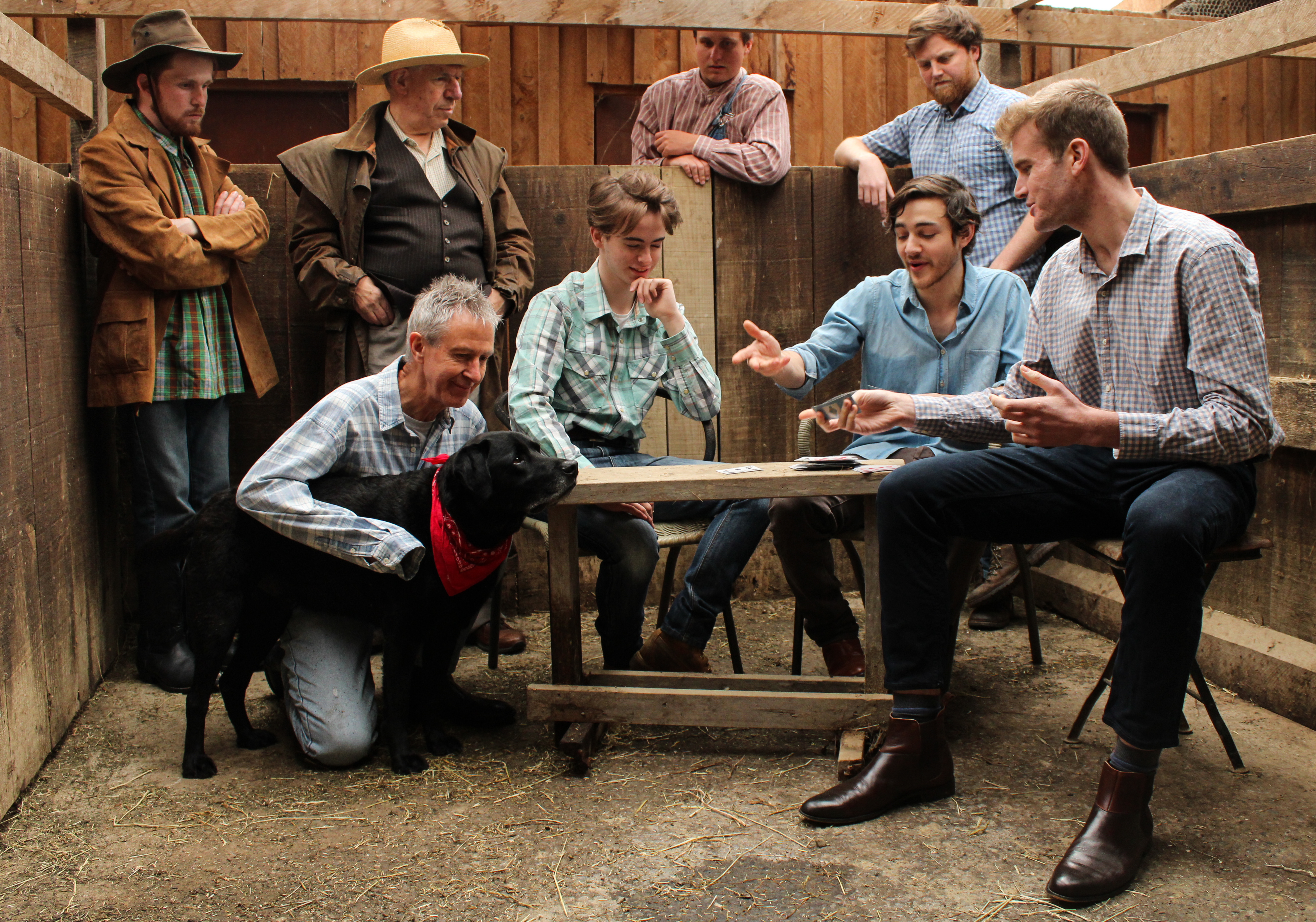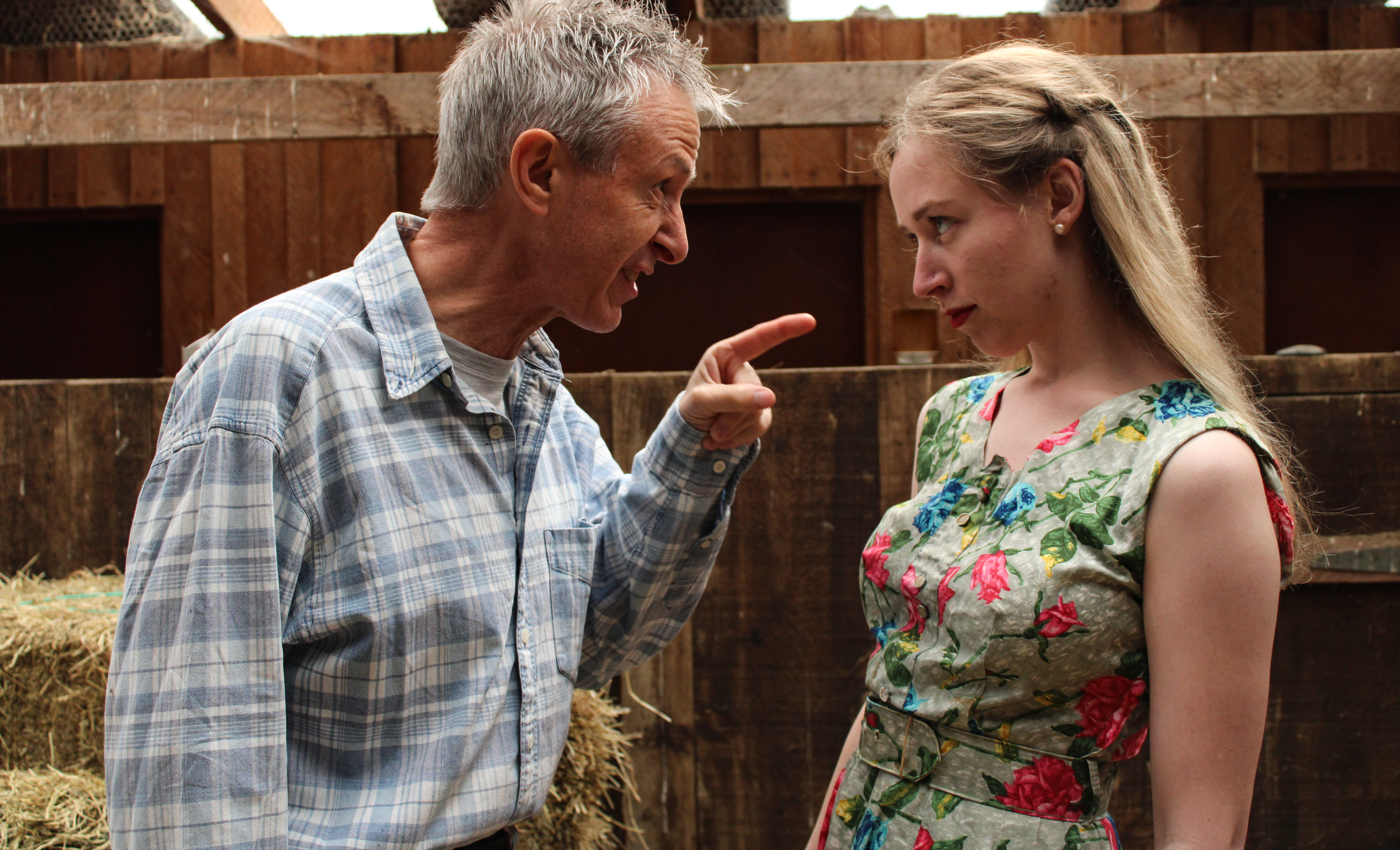
“In every bit
of honest writing in the world there is a base theme. Try to
understand men, if you understand each other you will be
kind to each other. Knowing a man well never leads to hate
and nearly always leads to love. There are shorter means,
many of them. There is writing promoting social change,
writing punishing injustice, writing in celebration of
heroism, but always that base theme. Try to understand each
other.” - Jonn Steinbeck, 1938 journal
entry.
Published in 1937, John Steinbeck's well-known novella explores the experiences of George Milton and Lennie Small, itinerant field workers and long-time friends who are determined to earn enough money to fulfill their dream of owning a small piece of land and drift around California in search of new job opportunities during the Great Depression of the 1930s. Not so well-known is that Steinbeck also wrote the story as a stage play, which was first performed in the same year as the novella was published. Since then, there have been various adaptations - a musical, an opera, a TV movie, a radio play, and several films. The latest version of Steinbeck’s original script is currently being produced by the Khandallah Arts Theatre.
The story Steinbeck tells has proved to be difficult, challenging, and controversial. It is based on his adolescent experiences working with migrant farm workers in the 1910s (before the arrival of the displaced Okies that he described in The Grape of Wrath) and takes its title from Robert Burns' poem To a Mouse - "The best laid schemes o' mice an' men / Gang aft agley.” Earning the best response of any of his works up to then, it was chosen as a Book of the Month Club selection before being published, and early praise for the work came from such notable critics as Maxine Garrard, Christopher Morley, and Harry Thornton Moore in New Republic. New York Times critic Ralph Thompson described it as a "grand little book, for all its ultimate melodrama." It was then promptly banned from various US school libraries or curricula for allegedly "promoting euthanasia,” "condoning racial slurs", being "anti-business", and containing profanity, as well as "vulgar" and "offensive language". While still taught in many schools, Of Mice and Men has been a frequent target of censors not only for its perceived vulgarity, but also for what others consider offensive racist language, which is why it is listed in the American Library Association's list of the Most Challenged Books of 21st Century.
Most of the bans and restrictions have since been lifted, however, and the novella remains required reading in many other US, Australian, Irish, British, New Zealand, and Canadian high schools. It has been challenged (proposed for censorship) fifty-four times since its publication. However, scholars like Thomas Scarseth have argued that "in true great literature the pain of Life is transmuted into the beauty of Art” and fought to protect the book by arguing for its literary value. In the UK, it was ranked as number fifty-two of the "nation's best loved novels" on the BBC's 2003 survey The Big Read.
Several major themes clearly emerge from director Tanya Piejus' wonderful new production at Cochran Hall in Khandallah. In the era of Dale Carnegie, Steinbeck emphasized the importance of positive aspirations throughout his novella. George dreams of establishing his independence, to become his own boss and purchase his own homestead, to become "somebody." Lennie wants nothing more than to be with George on his independent homestead and to quench his fixation on soft objects. Candy aspires to reassert his responsibility lost with the death of his dog and for security for his old age - on George's homestead.
Crooks also yearns for a small homestead where he can enjoy self-respect, security, and acceptance. Curley's wife wants to become an actress, to satisfy her desire for fame lost when she married Curley and an end to her loneliness. The hand of Fate is felt most heavily as the characters' aspirations are destroyed and George is unable to protect Lennie when he is in real danger. Steinbeck presents this as "something that happened," suggesting a non-judgmental or non-teleological shrug of the shoulders.
Isolation is also a significant factor in the lives of most characters. Crooks states this theme candidly - "A guy goes nuts if he ain't got anybody. Don't make any difference who the guy is, long's he's with you." Candy is lonely after his dog is gone. Curley's wife is lonely because her husband is not the friend she hoped for and deals with her isolation by flirting with the men on the ranch, which increases Curley's abusive jealousy. George and Lennie's friendship is the result of loneliness. The story is situated near the town of Soledad, "solitude" in Spanish. Despite this basic human need for companionship, Steinbeck emphasizes how loneliness is sustained by the barriers we establish by behaving badly to each other. The loneliness of Curley's wife is further reinforced by his jealousy, which causes all the ranch hands to avoid her. Crooks' barrier is the result of being barred from the bunkhouse and restrained to the stables. His bitterness is partially ameliorated, however, by Lennie's ignorance.
Steinbeck's characters are often powerless due to intellectual, economic, and social circumstances beyond their control. Lennie possesses the greatest physical strength of any character, which would otherwise establish a sense of respect as he is employed as a ranch hand, but his intellectual handicap undercuts this and results in his essential impotence. Economic powerlessness is established as many of the ranch hands are victims of the Great Depression. George, Candy, and Crooks are positive, action-oriented characters who dream of purchasing a homestead, but are unable either to generate or to save enough money. Lennie's mental disabilities render him the only character who is literally unable to take care of himself.

Finally, the twinned themes of oppression and abuse are mostly clearly illustrated by the interaction between Curley and his wife. Curley's over-assertive, even at times aggressive Napoleon complex is also revealed in his attempt to take control of his father's farm and by threatening the farm hands for minuscule incidents, constantly reprimanding them, even accusing some of fooling around with his wife. She, on the other hand, is not physically, but verbally manipulative, using her sex appeal to garner attention and flirting with the farm hands. According to the Penguin Teacher's Guide for Of Mice and Men, Curley and his wife are both evil in that they oppress and abuse the migrants, but in different ways.
Piejus commented, “My Mum introduced me to John Steinbeck’s classic novella, Of Mice and Men, when I was about fifteen and I’ve always loved the story for its timeless portrayal of friendship, loneliness, and unfulfilled dreams. However, I wasn’t aware that at the same time as writing the novella, Steinbeck had also written a stage play.”
Of Mice and Men is Piejus' fourteenth play as director and third for KAT. She wrote and directed Tommy and the Jabberwockfor the Play in the Park in 2015 and directed A Streetcar Named Desire, in 2018. She has been involved with theatre in Wellington since 2005 when she was cast in KAT's Under Milk Wood and also trod the boards on the KAT stage inGoldilocks and the Three Bears, Twelfth Night, The Big OE, The Wind in the Willows, Table Talk and last year's At The Bay. She has loved Steinbeck's novel since she was a teenager and when she saw NTLive revival of the play a 2014 with James Franco as George and Chris O’Dowd as Lennie, decided to direct it herself.
“What I love most about the story is the strength of the brotherly relationship between the intelligent George and the intellectually challenged Lenny. George’s love for Lenny eventually leads him to make a tragic decision, which in the context of the story seems to be the only option. The themes of friendship, loneliness and unfulfilled dreams are also reflected in the lives of some of the other characters - the ageing Candy whose life revolves around his equally ageing dog; Crooks, the bitter and isolated black stable-hand; Curley’s wife, mistrusted by her husband and never referred to by name by any of the men.”
Tanya says she will be interested in how contemporary Kiwi audiences receive the play - “In the past, and especially in America, it’s been accused of ‘promoting euthanasia’, ‘condoning racial slurs,’ and being ‘anti-business.’ What will we take from it in this era of Black Lives Matter, having so recently voted in the referendum on the End of Life Choice Act, and with Covid-19 affecting so many small businesses?”
“Despite being written in 1937, the play remains very relevant today. We’ve just voted resoundingly for legislation that allows assisted dying. The character of Crooks exists purely to highlight issues of racism in the US. And who among us hasn’t had to wrestle with relationships, uncertainty about their future, and feeling left out?”
Venue:
Cochran Hall, 106 Cashmere Ave, Khandallah.
Evenings:
7:30 on 12/11, 13/11, 14/11 and 19/11, 20/11,
21/11
Matinee: 4:00 on 15/11
Information:
www.kat-theatre.org.nz 022 083
5499



 Te Whatu Ora Health NZ: Health Warning – Unsafe Recreational Water Quality At Roto Kohatu Reserve At Lake Rua
Te Whatu Ora Health NZ: Health Warning – Unsafe Recreational Water Quality At Roto Kohatu Reserve At Lake Rua Shearing Sports NZ: Shearing Them Around - 11 Shearing Records In 2024
Shearing Sports NZ: Shearing Them Around - 11 Shearing Records In 2024 The New Zealand Retro: Special End Of Year Retro Chart Show On Independent Radio Stations
The New Zealand Retro: Special End Of Year Retro Chart Show On Independent Radio Stations ASB Polyfest: Polyfest’s 50th Celebrations On Track Despite Funding Cuts
ASB Polyfest: Polyfest’s 50th Celebrations On Track Despite Funding Cuts Air New Zealand: Raw Thrills - Air New Zealand's Most Popular Inflight Entertainment Revealed
Air New Zealand: Raw Thrills - Air New Zealand's Most Popular Inflight Entertainment Revealed Hustle Management: Celebrating 50 Years Of Music, Now And Then, With Mark Williams
Hustle Management: Celebrating 50 Years Of Music, Now And Then, With Mark Williams